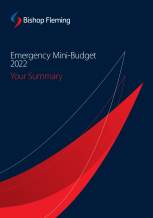Emergency Mini-Budget 2022 at a glance
Download our full Mini-Budget Summary here.
Check what tax policies have survived the Mini Budget
Emergency Mini Budget 2022 announcements made on 23 September 2022 (updated to 19 October 2022)
Going for Growth through borrowing, deregulation and massive tax cuts was the theme of Chancellor Kwasi Kwarteng’s radical first Budget, called The Growth Plan ahead of an Autumn Budget on 31 October. This is in stark contrast to the non-event of Rishi Sunak's Spring Statement earlier this year.
On 14 October 2022, Kwasi Kwarteng was replaced as Chancellor by Jeremy Hunt.
Against the Bank of England's 0.5% increase in interest rates to 2.25% (with more increases likely) and inflation running at around 10% (and likely to rise), the Chancellor borrowed around £50bn to cut taxes to boost growth, including most notably National Insurance Contributions (NICs) and stamp duty, and scrapped April 2023's 6% rise in Corporation Tax.
On 14 October 2022, it was confirmed that the 6% rise in Corporation Tax will proceed after all.
From April 2023 the basic rate of Income Tax will be cut from 20p to 19p (although this was subsequently delayed by one year). And the Government will abolish the 45p additional rate completely, although this proposal was reversed 10 days later.
(It could also, but didn't, chose to remove the abatement of personal allowances on earnings between £100,000-£125,000 which creates an effective tax rate of 60%.).
Although the basic rate was planned to be cut to 19% from April 2023, there was also planned a four-year transition period for Gift Aid relief to keep basic rate relief at 20%, until April 2027. There will also be a one-year period for relief at source pension schemes to allow them to continue to claim relief at 20%. As the 1p cut was later delayed for one year, presumably these reliefs will also be delayed by one year.
The top rate of tax in Scotland remains at 46% for income over £150,000.
Also from April 2023, the ordinary and upper rates of dividend tax will be reduced back to the 2021/22 levels of 7.5% and 32.5% respectively.
The off-payroll rules will be scrapped. The 2017 and 2021 reforms to the off-payroll working rules (also known as IR35) will be repealed from 6 April 2023. From this date, workers across the UK providing their services via an intermediary, such as a personal service company, will once again be responsible for determining their employment status and paying the appropriate amount of tax and NICs. Employers will be pleased, but also annoyed that they have wasted years complying with these rules.
The IR35 rules, which have been in place since 2000, are NOT abolished.
Borrowing costs are now back to 2008 levels, but Kwarteng appears to have popped back even further to 1988 and Nigel Lawson's famous tax-cutting Budget for inspiration (where he cut the basic rate of income tax from 27% to 25% and scrapped income tax rates above 40%). Comparisons have also been made with Anthony Barber's "dash for growth" Budget of 1972.
The Treasury has been ordered to focus on tax cuts, and growing the UK economy by a trend rate of 2.5%, in the face of rising public borrowing, which means that the Bank of England's policy of slowing growth through raising interest rates and the Treasury's tax-cutting fiscal policy to boost growth are effectively pulling in different directions.
Add to that the £150bn support being given to households and businesses with an energy price cap and you can see that public debt will rack up considerably more than the £400bn+ already spent on the pandemic. The gamble is that growth will bring this down.
There are undoubtedly many more surprises to come in the Autumn Budget, or as the Treasury are calling it the Medium-Term Fiscal Plan on 31 October 2022, when new Chancellor Jeremy Hunt will unveil more measures to boost UK economic growth. Will he also look at capital taxes?
We shall have to wait and see.
Key changes announced ahead of today:
- National Insurance rise will be reversed from 6 November 2022
- Energy bills help for businesses unveiled
- New energy help unveiled for households:
- All retained EU laws will be sunset on 31 December 2023
- HMRC interest rates for late payment of tax rise from 1.75% to 2,25% from 3 October 2022
Emergency Mini-Budget 2022 key measures announced:
- The Energy Bill Relief Scheme will help to cut energy prices for businesses, charities and public sector organisations. The scheme will run for 6 months and cover energy used from 1 October 2022 to 31 March 2023.
- Government aims to achieve a trend growth rate of 2.5% for the UK economy.
- Government help with energy bills will reduce inflation by around 5%
- New legislation to streamline complex planning laws
- Changes are being made to Universal Credit to encourage more people into work.
- Accelerate reforms to the pension rules
- Removal of the cap on banker's bonuses
- New investment zones with 10-year tax benefits such as no stamp duty, reduced NICs and no business rates. Up to 40 places could be designated.
- The planned 6% rise in Corporation Tax to 25% from April 2023 was initially scrapped, but on 14 October 2022 this was reversed so that the 25% rate will happen from April 2023.
- Annual Investment Allowance will remain permanently at £1m
- Widening the criteria of the Seed Enterprise Investment Scheme (SEIS), including allowing firms to now raise £250,000 under the scheme - 66% more funding than previously.
- The Company Share Option Plan (CSOP) limit allows businesses to offer employees share options worth up to £30,000. This is doubling to £60,000.
- Off-payroll rules to be scrapped from April 2023.
- Alcohol duty will be frozen from February 2023.
- Reversal of 1.25% NIC rise from 6 November 2022 and associated dividend tax rates rise reversed next April
- Stamp Duty Land Tax in England is removed from properties worth up to £250,000, or £425,000 for first-time buyers purchasing properties for up to £625,000
- From April 2023 the basic rate of Income Tax will be cut from 20p to 19p. And the Government will abolish the 45p additional rate completely (although this was later reversed).
- The Office of Tax Simplification is to be scrapped.
- VAT-free shopping to be introduced for overseas visitors
Budget documents
- The Growth Plan 2022: Factsheet on Income Tax
- The Growth Plan 2022: Factsheet on Stamp Duty Land Tax
- The new alcohol duty system: consultation
- The Growth Plan 2022: Factsheet on Corporation Tax
- The Growth Plan 2022: Factsheet on Investment Zones
- The Growth Plan: Factsheet on cancellation of National Insurance rise and Health and Social Care Levy
- Investment Zone applications open
Links to HM Treasury pages
- HM Treasury Growth Plan
- HM Treasury page
- HM Treasury Spring Statement 2022
- HM Treasury Autumn Budget 2021
- HM Treasury Spring Budget 2021
Spring 2022 Statement and Tax Tables
Other related links
- Finance Bill 2022-2023
- Department for Business, Energy and Industrial Strategy Growth Plan
- Economic Crime and Corporate Transparency Bill 2022
- Tax policy consultations
[Gary Mackley-Smith]






